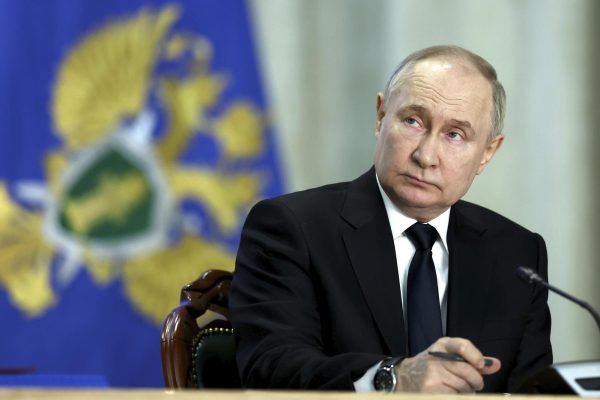American Conflict Over Ukrainian War
At Congresswoman Alexandria Ocasio-Cortez’s (D- NY 14th District) city hall meeting on Oct. 12, protestors who appeared to be former supporters heckled and exclaimed, according to videos widely circulated by news sources like The Hill, “Congresswoman! None of this matters unless there is a nuclear war in which you voted to send arms and weapons to Ukraine!… You ran as an outsider.… Why are you playing with the lives of American citizens?… [another protestor said] I believed in you, and you became the very thing you sought to fight against!”
Wow, has support for Ukraine seriously dried up? What happened to all the support or platitude Ukraine was getting five months ago? What are the current arguments for and against continued support of Ukraine, and which party supports which view?
In March of last year, the cross-partisan response to Russia uniformly supported strong sanctions and quick military support. Both parties have observed a similar trend of support but only in their electorates, not by their elected representatives. Interestingly, overall support for Ukraine in the voting body has decreased substantially on both sides of the aisle. Pew Research Center reports that in March 2022, 49 percent of the “Republican/Rep-leaning” demographic and 38 percent of the “Democrat/Dem-leaning” demographic described the support for Ukraine as “not enough.” However, by September 2022, support had dropped to a dismal 16 and 20 percent, respectively. Despite the dwindling support for Ukraine, the Democratic/Dem-leaning members, media outlets and personalities seem disproportionately supportive of the war against Russia. In contrast, Republican/Rep-leaning entities seem to have become less supportive.
There are two approaches, each primarily held by the opposite political party, to how the U.S., Ukraine’s biggest donor by a wide margin, as recorded by The Economist, should tackle Ukraine’s war moving forward. The first says to draw a hard line on the war calling nuclear threats made by Putin bluffs and continuing to send military aid to Ukraine, pledging indefinite material support and agreeing to any counter-offensive against Russian forces, aiming to recuperate as much land as the Ukrainians desire. The other proposal is to pressure Ukraine into a peace treaty compromise. The Biden administration, alongside most of the Democratic Party, supports the former approach and defers to an autonomous Ukraine about when the war should end. Meanwhile, with exceptions, the Republican Party has supported a strategic peace compromise to prevent military escalation, especially against the prospect of nuclear war, and to save funds and supplies.
Republican politicians and pundits like Fox News’ Tucker Carlson primarily believe the Democrats are warmongers who have tried to fuel the war to claim success in dismantling Putin’s regime, with which Trump tried to cultivate a friendly relationship. Carlson explained that when former Prime Minister Boris Johnson visited Ukraine on April 9, the White House sent him to deliver two messages: “The first is that Putin is a war criminal. He should be pressured, not negotiated with, and the second is that even if Ukraine is ready to sign some agreements on guarantees with Putin, the West is not.” (quote cited from the Ukrainian newspaper Ukrainska Pravda). Additionally, Carlson believes that Putin is irrational and without the best intentions for his country, much less for the rest of the world, so if he were pushed to the limit and thought his position was under threat, he would lash out with any means at his disposal, including nuclear options, as he has threatened. Many on the Right have consistently argued that the U.S. should de-escalate war tensions and settle the conflict to avoid unnecessary consequences. They believe a path to compromise without losing too much face must be laid out to Putin to avoid unnecessary losses that escalation would cause.
One fundamental concern of conservatives is that they dislike the Biden administration’s war objectives and believe that rather than a priority in securing the best long-term position for the U.S. or Ukraine, its first concern is virtue signaling and influencing Ukraine with liberal-progressive ideology against a more traditional, conservative Russia. The Claremont Review of Books says, “The U.S. seeks to rally the world’s peoples to a culture war against an enemy whose traditionalism [is a symbol of evil].” Conservative media, such as the Daily Wire, regularly make fun of and condemn leftists for politicizing the war and using the Ukrainian flag alongside Pride flags. The Claremont Review of Books evidenced that on March 24, the administration announced its priorities to support “especially vulnerable populations such as women, children, lesbian, gay, bisexual, transgender and intersex (LGBTQI+) persons, and persons with disabilities.”
Meanwhile, according to Forbes, Biden called Putin a “rational actor.” In a CNN interview last week, Biden said, “clearly he could leave, he could just flat leave, and still probably hold his position together in Russia … I have no intention of meeting with him [to negotiate the war in Ukraine].” He reiterated his commitment to the defense of Ukraine’s democratic sovereignty. In response to Biden, Conservative political pundit and Founder and CEO of The Daily Wire, Ben Shapiro, said on his show and podcast, “what Biden is saying is that there is no off-ramp [for Putin] here … maybe Putin doesn’t have the same calculations since he is the actual dictator in charge of a country. Maybe Putin is a bit more worried, less sanguine, about his ability to hold on to power should this Ukrainian war fail.” DefenseNews reports that other Republicans, such as the House’s No. 2 and No. 3 leaders, have legislated this sentiment against the war by not supporting the most recent, 12.3 billion-dollar military aid package. Republicans also often couple this sentiment of the growing prospect of total war with the current failing U.S. economy and high inflation to explain that we are not in a position to continue funding a fight that can end in devastation.
Meanwhile, CNN points out that Ukraine has momentum on its side as it regains territory, and Belarus is Russia’s only public supporter to imply Russia would be unlikely to take the risk of nuclear war when its biggest ally, China, is likely not onboard. The problem is that outside of the U.S. and its European allies, the war is viewed as a regional conflict, not one that warrants global attention. According to the Washington Post, India and China have committed themselves to trade agreements, goodwill alliances and joint military exercises. However, both remain neutral in the war even though India’s Prime Minister Narendra Modi has said that “this is not the time for war.”
It seems as though this issue will continue to be politically contentious and play a role in the coming midterm elections and the presidential election, which may dictate how much support Ukraine will obtain in the future. If the House becomes Republican, a reversal may occur. Nonetheless, where will electorate discontent bring our foreign policy? What would be our reaction to a strategic nuclear bomb detonation in Ukraine for a war in which we no longer desire to be militarily involved?

Robert "Jerry" Pfeifer is a junior from New Paltz, NY concentrating in political science. He has previously served as a staff writer for the Arts &...










